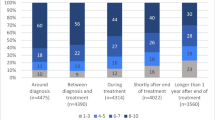Abstract
Patients with lung cancer have numerous and varying needs spanning across the cancer trajectory; however, only limited research has focused specifically on the pre-diagnosis phase. A multicentre cross-sectional survey was conducted to explore the experience of lung cancer patients during the pre-diagnosis phase. High levels of anxiety were reported by many participants (45.6 %). Informational (32.1 %), and emotional (24.1 %) needs were reported as most important; the majority (89.0 %) reported these needs were met. Most participants sought information throughout, with many (38.6 %) rating their oncology health care providers to be the best source of information. The majority (70.0 %) reported that they were not directed to any resources to help address their anxiety. During pre-diagnosis, informational and emotional needs appear most important, and for the majority, these were reportedly met. Although many experienced high levels of anxiety, few were directed to resources to address it.
Similar content being viewed by others
References
Canadian Cancer Society’s Steering Committee (2010) Canadian Cancer Statistics 2010. Canadian Cancer Society, Toronto
American Cancer Society (2010) Cancer facts & figures 2010. American Cancer Society, Atlanta
Liao YC, Liao WY, Shun SC, Yu CJ, Yang PC, Lai YH (2010) Symptoms, psychological distress, and supportive care needs in lung cancer patients. Support Care Cancer 15:1–9
Carlson LE, Angen M, Cullum J, Goodey E, Koopmans J, Lamont L et al (2004) High levels of untreated distress and fatigue in cancer patients. Br J Cancer 90(12):2297–304
Hill KM, Amir Z, Muers MF, Connolly CK, Round CE (2003) Do newly diagnosed lung cancer patients feel their concerns are being met? Eur J Cancer Care (Engl) 12(1):35–45
Sanders SL, Bantum EO, Owen JE, Thornton AA, Stanton AL (2010) Supportive care needs in patients with lung cancer. Psychooncology 19(5):480–489
Li J, Girgis A (2006) Supportive care needs: are patients with lung cancer a neglected population? Psychooncology 15(6):509–516
Fitch M (2000) Supportive care for cancer patients. Hosp Q 3(4):39–46
Murray SA, Kendall M, Boyd K, Worth A, Benton TF (2004) Exploring the spiritual needs of people dying of lung cancer or heart failure: a prospective qualitative interview study of patients and their carers. Palliat Med 18(1):39–45
Schag CAC, Ganz PA, Wing DS, Sim M-S, Lee JJ (1994) Quality of life in adult survivors of lung, colon and prostate cancer. Qual Life Res 3(2):127–141
Liao MN, Chen MF, Chen SC, Chen PL (2008) Uncertainty and anxiety during the diagnostic period for women with suspected breast cancer. Cancer Nurs 31(4):274–283
Drageset S, Lindstrom TC (2003) The mental health of women with suspected breast cancer: the relationship between social support, anxiety, coping and defence in maintaining mental health. J Psychiatr Ment Health Nurs 10(4):401–409
Poole K, Hood K, Davis BD, Monypenny IJ, Sweetland H, Webster DJ et al (1999) Psychological distress associated with waiting for results of diagnostic investigations for breast disease. Breast 8(6):334–338
Anderson AS, Klemm P (2008) The internet: friend or foe when providing patient education? Clin J Oncol Nurs 12(1):55–63
Wiljer D, Catton P, Kane G, Leonard K, Neligan D, Schwartz D, et al (2007) The new digital divide: Bridging the gap between patients and practice. International Medical Informatics Association (IMIA), Proceedings.
Nelson D, Kreps G, Hesse B, Croyle R, Willis G, Arora N et al (2004) The Health Information National Trends Survey (HINTS): development, design, and dissemination. J Health Commun 9(5):443–460
Graves KD, Arnold SM, Love CL, Kirsh KL, Moore PG, Passik SD (2007) Distress screening in a multidisciplinary lung cancer clinic: prevalence and predictors of clinically significant distress. Lung Cancer 55(2):215–224
Pollock K, Cox K, Howard P, Wilson E, Moghaddam N (2008) Service user experiences of information delivery after a diagnosis of cancer: a qualitative study. Support Care Cancer 16(8):963–973
Gabrijel S, Grize L, Helfenstein E, Brutsche M, Grossman P, Tamm M et al (2008) Receiving the diagnosis of lung cancer: patient recall of information and satisfaction with physician communication. J Clin Oncol 26(2):297–302
Quirt CF, Mackillop WJ, Ginsburg AD, Sheldon L, Brundage M, Dixon P et al (1997) Do doctors know when their patients don’t? A survey of doctor–patient communication in lung cancer. Lung Cancer 18(1):1–20
Schofield PE, Butow PN, Thompson JF, Tattersall MHN, Beeney LJ, Dunn SM (2003) Psychological responses of patients receiving a diagnosis of cancer. Ann Oncol 14(1):48–56
Mayer DK, Terrin NC, Kreps GL, Menon U, McCance K, Parsons SK et al (2007) Cancer survivors information seeking behaviors: a comparison of survivors who do and do not seek information about cancer. Patient Educ Couns 65(3):342–350
Hack TF, Degner LF, Parker PA (2005) The communication goals and needs of cancer patients: a review. Psychooncology 14(10):831–845
Pardon K, Deschepper R, Vander Stichele R, Bernheim JL, Mortier F, Schallier D et al (2010) Are patients preferences for information and participation in medical decision-making being met? Interview study with lung cancer patients. Palliat Med 25(1):62–70
Butow PN, Kazemi JN, Beeney LJ, Griffin AM, Dunn SM, Tattersall MHN (1996) When the diagnosis is cancer: patient communication experiences and preferences. Cancer 77(12):2630–2637
Acknowledgement
This research was supported by funding from Cancer Care Ontario. The authors gratefully acknowledge the participation of the patients and the contribution of the oncologists and research staff involved in this study at the Juravinski Cancer Centre, the Thunder Bay Regional Cancer Care and the Princess Margaret Hospital. The opinions, results and conclusions reported in this article are those of the authors and not necessarily those of Cancer Care Ontario.
Author information
Authors and Affiliations
Corresponding author
Rights and permissions
About this article
Cite this article
Wiljer, D., Walton, T., Gilbert, J. et al. Understanding the needs of lung cancer patients during the pre-diagnosis phase. J Canc Educ 27, 494–500 (2012). https://doi.org/10.1007/s13187-012-0345-0
Published:
Issue Date:
DOI: https://doi.org/10.1007/s13187-012-0345-0




